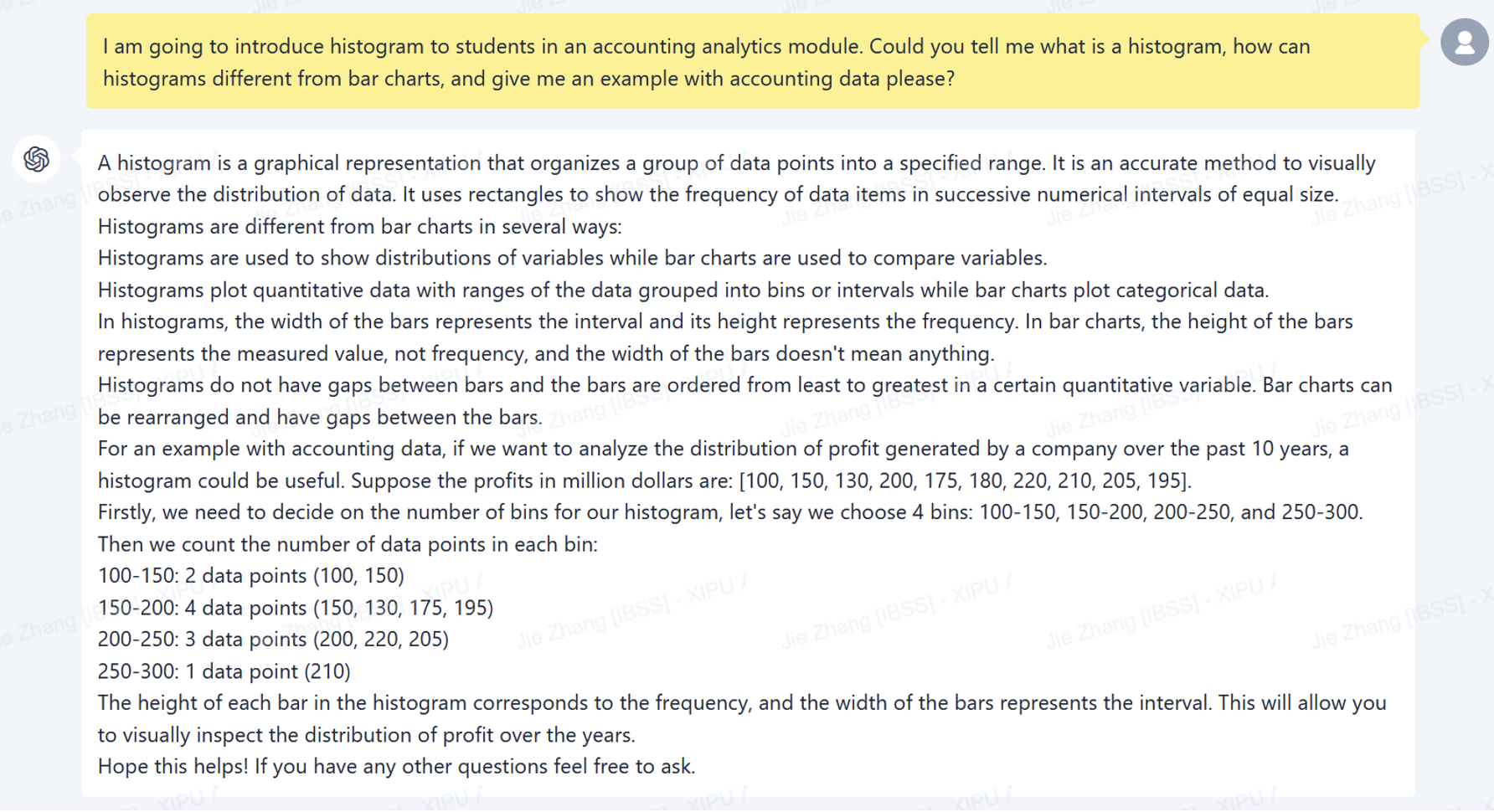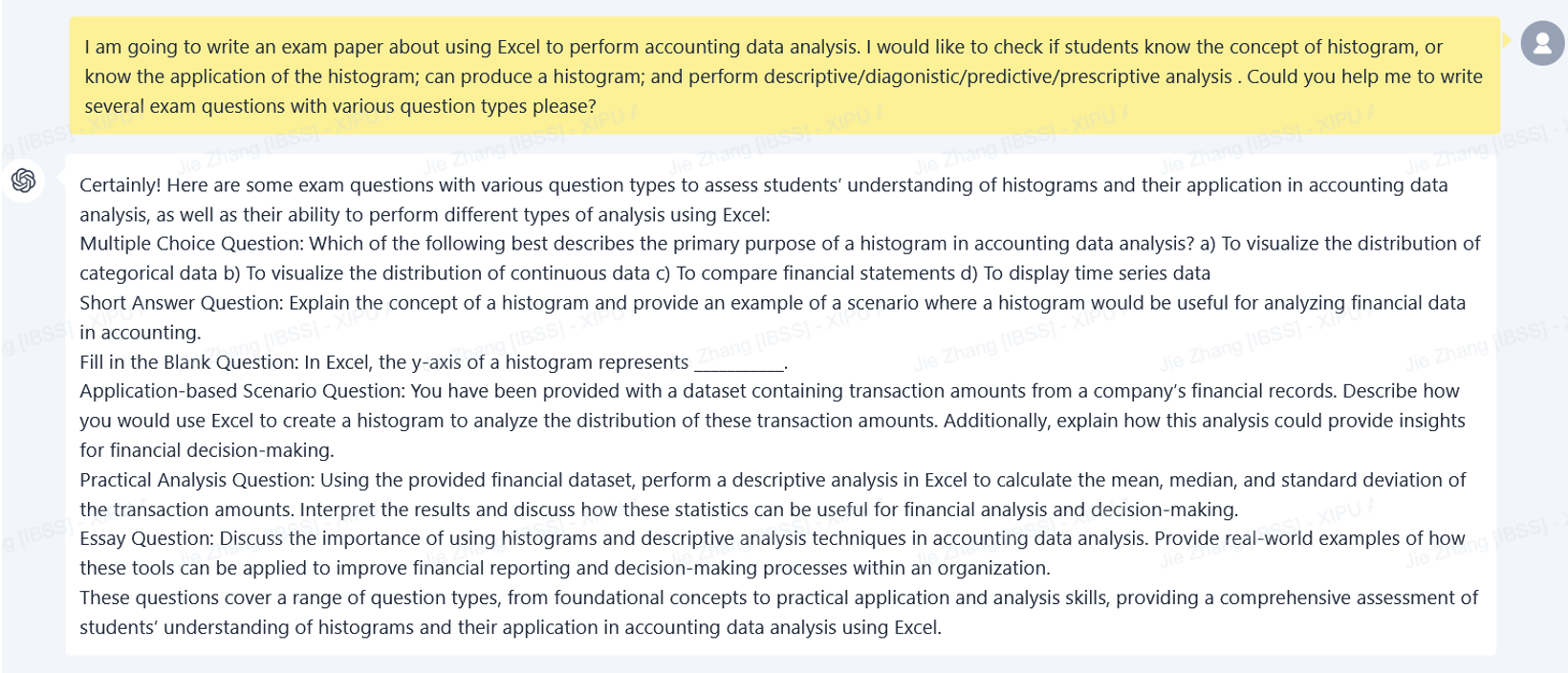Module Background:
The Accounting Analytics module, situated in the fourth year of the curriculum, is designed to enhance students' analytical skills, equipping them with the capability to conduct comprehensive accounting analysis - descriptive, diagnostic, predictive, and prescriptive. This module emphasizes the practical application of data analytics techniques across a wide array of accounting topics — building upon the foundational knowledge acquired in year two and year three. Central to this module are Excel and Tableau, both of which are cornerstone applications in the professional accounting landscape.
Nevertheless, the teaching and learning process within this module poses several challenges, notably arising from students' initial limited computer literacy. Proficiency in operating data analysis software is indispensable for effective accounting analytics. Despite introducing these skills in the classroom, students often struggle to comprehend the complex operations involved in leveraging the requisite software. Furthermore, a reliance on classroom demonstrations may inadvertently restrict students' exposure to varying software applications in diverse accounting contexts, consequently impeding the application of data analytics techniques. Therefore, a significant challenge lies in enhancing student engagement with these software tools while simultaneously reinforcing their retention of operational skills. Another challenge is the dearth of comprehensive data cases and data sets covering various accounting scenarios for students to practice and enhance their data analytics skills. Developing relevant data cases can be rather time-consuming.
To navigate these challenges and optimize teaching and learning outcomes, we have integrated XIPU AI, powered by ChatGPT, into the module. This article aims to illustrate the transformative application of XIPU AI within this module and explore its considerable roles in teaching, learning, and assessment.
Using AI in Teaching:
Within this module, XIPU AI is mainly used for two purposes in teaching:
- Conceptual Explanation and Exemplification: XIPU AI can simplify and articulate complex accounting concepts. It provides real-world examples, further enhancing students' understanding of theoretical concepts. This interactive approach, fostering deeper comprehension and improving retention, encourages students to actively participate in their learning process. However, it's important to verify the accuracy of any real-life examples.

- Production of Practice Data Cases: A distinctive advantage of using XIPU AI in teaching is its capability to assist in writing data cases that correspond to various scenarios in accounting subjects for student practice. This provides students with more practical experience and further deepens their understanding of the subject.
Using AI in Learning:
In this module, students are encouraged to leverage XIPU AI's powerful capabilities to enrich their learning experience.
- Highlight the Convenience Factor: One significant advantage of AI lies in its availability. XIPU AI operates continuously. It allows students to ask questions and resolve doubts anytime, eliminating the constraint of scheduling conflicts. This 24/7 availability provides students the freedom to learn at their own pace and on their own schedule.
- Fostering Interactive Learning: XIPU AI promotes an engaging learning environment. Instead of passively absorbing information from static materials, students can actively interact with the AI, receiving real-time responses. This dynamic, responsive interaction is to customize individual learning styles, making learning more effective and enjoyable.
- Data Analysis Project Support: XIPU AI can assist students through various stages of a data analysis project, including brainstorming questions, guiding software operations for data cleaning, assisting in data analysis, aiding with data visualization, and polishing language for presentation scripts.
- Facilitating Problem-Solving: Beyond serving as an answer provider, it's also a platform for learning from mistakes. Students can inquire about the incorrect operations, and the rationale behind incorrect operations, fostering a deeper understanding of the subject by clarifying misconceptions and refining their problem-solving skills.
Using AI in Assessment:
XIPU AI can also be utilized effectively for designing both formative and summative assessments, offering constructive feedback.
- Formative Assessment: XIPU AI adeptly generates various challenges and puzzles related to accounting analytics as formative assessments. This strategy can be highly effective in checking students’ understanding, with the added benefit of real-time feedback on students’ responses. This immediate evaluation helps students correct their course of learning instantly, promoting their understanding and reducing repeated mistakes.
- Exam Paper Construction: XIPU AI emerges as a remarkable tool in constructing exam papers, providing several key benefits:
- Concept-related Questions: XIPU AI has the capability to generate a variety of questions related to specific accounting concepts, ensuring a comprehensive assessment of a student's understanding and mastery of the subject matter.
- Diverse Question Types: Based on the learning objectives, XIPU AI can create varied types of questions, including multiple-choice, short answer, and problem-solving, assessing various cognitive levels and analytics skills.

- Data Generation for Exam Questions: A unique advantage of lies in XIPU AI’s ability to generate diverse data sets corresponding to a wide range of scenarios in accounting subjects. The creation of these data sets manually can be quite time-consuming for examiners. XIPU AI streamlines this process, enabling the inclusion of practical, scenario-based questions that assess students' application of analytical skills effectively.
Conclusion:
This article illustrates the integration of XIPU AI into the undergraduate module Accounting Analytics in learning, teaching, and assessment. The incorporation of AI in the module offers a more dynamic, interactive, and effective approach to learning. By simplifying complex concepts and supplying practice data sets, XIPU AI proves to be a significant tool for enhancing the teaching process. Furthermore, the application of XIPU AI in assessments, providing on-demand test generation and real-time feedback, significantly improves the assessment design and feedback delivery processes. The use of AI in learning not only provides convenience and encourages active participation but also offers experiential learning, helping students improve their data analysis skills and understanding of accounting analytics more comprehensively.






